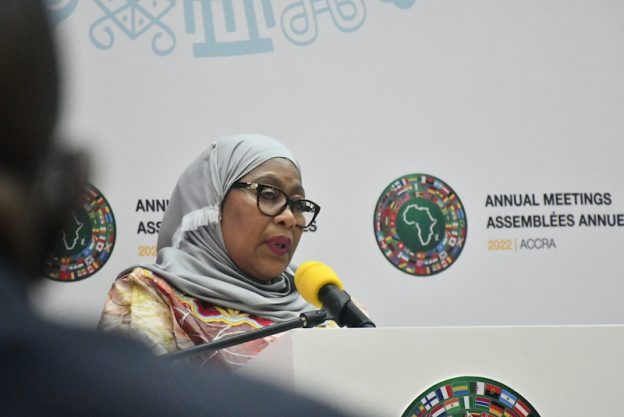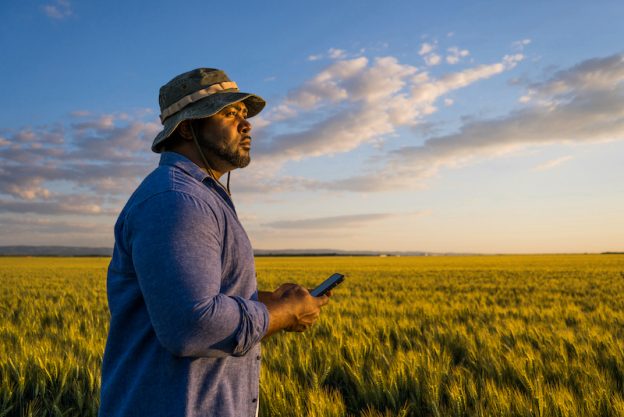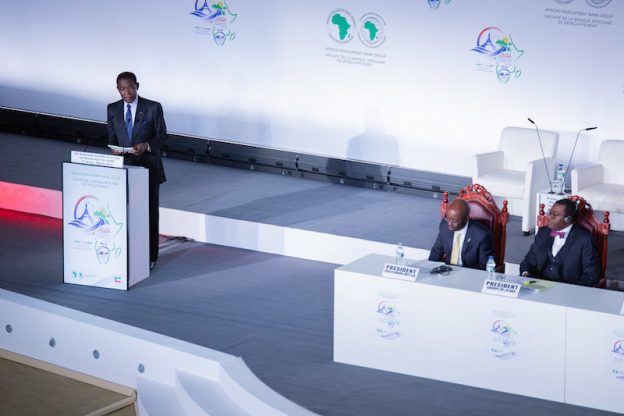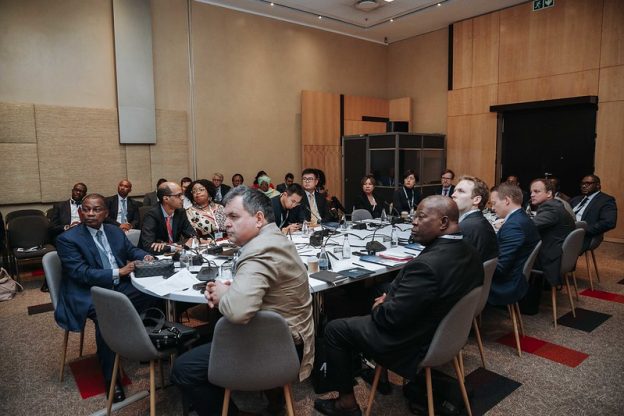The African Development Bank (AfDB) Group held its 2022 series of annual meetings in May in Accra, Ghana with the theme of achieving climate resilience and a just energy transition for Africa.
Highlights of the meetings:
- Food Security: Most countries in Africa are Agri-based. But going forward, they should engage in modern agriculture with technology, fertilizer & seed improvements, and not just produce, but also process and package high-value foods to quality standards that they can export. Agriculture can then bring transformation and jobs to rural areas.
Africa has 400 million hectares of savannah which, the President of the African Development Bank Group Dr. Akinwumi Adesina, said, is better than Brazil’s (which is a net exporter of maize, beef, and soya) – and that for Africa to be a major player of global food, must transform its Savannah.
In six years, the Bank’s Technologies for African Agricultural Transformation (TAAT) program has provided 76 million farmers with improved agricultural technologies. In Sudan, the AfDB provided certified heat-tolerant wheat seeds that, when cultivated over 65,000 hectares, made the country self-sufficient. In Ethiopia, the country progressively increased its acreage cultivated with certified heat-tolerant seeds from 5,000 to 167,000 hectares in 2021. With the increased harvest, they expert to export 1.5 – 2 million tons to Kenya and Djibouti.
- Energy Transformation: Currently 85% of the bank’s energy investment are in renewable energy with plans to double funding to $25 billion by 2025. While the bank has a policy not to support any coal, as part of its climate change, they acknowledge that intermittent renewable energy sources cannot power Africa alone, and that Power must also be accessible, secure and affordable.
• One solution for Africa is gas. Nigeria has $200 trillion worth to exploit, according to President Adesina who said that Europe, which gets 45% of its gas from Russia, should look to Africa. Other countries with gas potential are Ghana, Cote de Ivoire, Angola, and Morocco. The AfDB is assisting Mozambique with a $24 billion LNP project that may make the country the 3rd largest producer in the world.
• Some of the renewable energy investments the bank has undertaken are the Quarzazate Solar in Morocco – the world’s largest concentrated solar farm, the 3,000 MW Benban energy in Egypt, the $20 billion Sahel 10,000MW, and the largest wind project in Africa at Lake Turkana in Kenya.
• The bank is mobilizing $40 billion for South Africa to ease its transition from a reliance on 44,000 MW of coal toward renewable energy sources. Donors have committed $17 billion of grant financing, and concessions, that the bank will leverage to meet this gap without South Africa getting into debt. As the government plans to move to net-zero emissions, the AfDB has invested in solar (Xina and Redstone projects) and wind (Sere) and is also supporting a feed-in tariff for renewable energy. - The ADF: The Bank’s African Development Fund (ADF) receives donations from regional members and has provided $45 billion to low-income countries. Nine of the ten countries that are most vulnerable to climate change are in Africa and 100% are ADF countries. As the ADF needs more resources, the Bank plans to tap the ADF’s accumulated equity of $25 billion to raise $33 billion from capital markets. This will make the future of the ADF more sustainable and member countries will enjoy lower borrowing costs.
- The Infrastructure Gap: Infrastructure’s share of the bank’s funding portfolio is high because infrastructure projects are capital intensive. One project showcased was the Pokuase road interchange that is part of the Accra Urban Transport Project and which now disperses traffic on four levels to help reduce transport congestion in Accra. It was funded with $84 million from the Bank and the Government of Ghana.
Also at the summit, Tanzania’s President Samia Suluhu Hassan received the Africa Road Builders–Babacar Ndiaye prize for 2022. In her speech, she credited her predecessors, especially President John Pombe Magufuli who was a Roads and Public Works Minister in two governments before leading the country. The AfDB in 15 years had advanced $2.1 billion for 2,315 kilometres of road on the Tanzania mainland while Zanzibar has received $113 million for 139 kilometres of roads.
- Climate Change: One of the themes of the 2022 meetings was “achieving climate resilience”. Climate change is an existential threat with droughts, floods, and cyclones devastating Africa and causing losses of $7-15 billion a year. Even though the continent contributes just 4% of greenhouse gas emissions, it just gets 3% of climate-related financing. Developed nations had promised to fund Africa with $100 billion to adapt to climate change but this has not materialized and the Bank now plans to mobilize $25 billion for climate adaptation through a new fund.
- Creative Financing: During Covid, the bank launched a $3 billion social impact bond on global capital markets and the funds went to train 130,000 health workers, provide social protection for 30 million households, and business advisory for 300,000 SMEs. The Bank now plans to use its AAA-rated balance sheet to leverage $100 billion of Special Drawing Rights (SDR) from International Monetary Fund and grow that four times.
- Development Financing by the AfDB can be targeted at specific areas:
• Towards Food Security: In the wake of Russia’s invasion of Ukraine, food prices have gone up 30-40%, oil is 60%, and fertilizer prices tripled. So the AfDB launched a $1.5 billion African Emergency Food Production Facility to enable countries to intensify agricultural productivity and ward off the looming hunger crisis.
• For agriculture, President Adesina said the bank will allocate $1 billion to fund special agri-processing zone in rural areas of Zambia, Nigeria, Tanzania, Ghana, CIV and Senegal.
• Towards transformational infrastructure projects; the bank continues to fund ports, highways, bridges and border-crossing stations.
• Towards Youth Funding: one mechanism to help youth stop fleeing Africa will be through a youth entrepreneurship investment bank that will invest in youth business in 13 countries. The Bank is working on a mechanism to be ready after June 2022.
- Looming Debt: Even as African countries recovered in 2021 from Covid shocks, they face elevated debt levels and limited financial capacity that constrained further growth.
The bank has a focus on debt management of countries to improve the quality, sustainability and transparency of the debt. They will work with the World Bank, IMF and G20 nations to deal with private debt and commercial debt that now account for 44% of Africa’s debt. The Bank helped Somalia build back its debt management capacity after decades of war and negotiate debt relief with an arrears clearance plan and it now plans to l work with partners to do the same for Zimbabwe and build it back to an economic breadbasket.
- Rain parade: The Economist magazine dive-bombed the meetings with an article about a missing evaluator at the Bank. Later in his speech at the end of the summit, President Adesina said that a two-year external review of the Bank showed that its governance was world-class where areas of improvement were pointed out, these will be done. The joint communique at the end of the meetings mentioned the AfDB would implement the recommendations of a governance committee.
- Accra Image: The host nation of Ghana, celebrated 50 years since the passing of Kwame Nkrumah its founding President. It is seen as the birthplace of Africa as, in 1957 Ghana was considered the first Sub-Saharan country to achieve independence and is now a showcase for AfDB -financed projects including roads, farms and airports.
See more about the last in-person annual meetings – the 2019 AM in Malabo, Equatorial Guinea.
Picture of President Samia Suluhu Hassan of Tanzania, speaking after receiving the Babacar Ndiaye prize for 2022. Courtesy of Edgar Batte.
Next meetings: Following these first meetings since Covid, the next annual meeting will be at Sharm El Sheikh in Egypt from May 23-26, 2023. The new Chairman of the Board of Governors is Tarek Amer, the Governor of the Bank of Egypt. The First Vice-Chairperson will be a representative of Brazil and the second one will be from Uganda.



